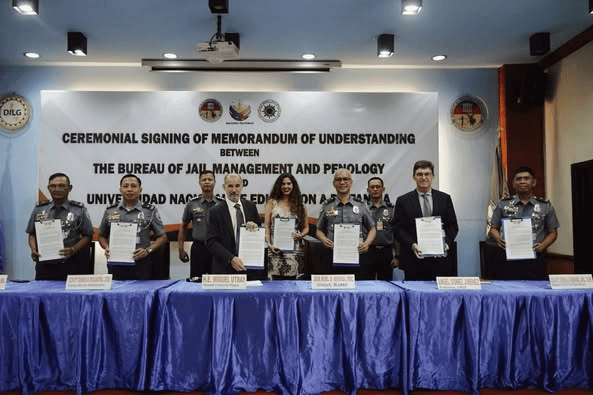BJMP, Spanish university team up to boost PDL development program
By Chito Chavez

The Bureau of Jail Management and Penology (BJMP) has partnered with the Universidad Nacional de Educacion A Distancia (UNED) of Spain in a bid to expand the country’s development programs for the benefit of the persons deprived of liberty (PDLs).
Spain ambassador to the Philippines His Excellency Miguel Ultray and UNED representatives AngelJimenez and Laura Gomez graced the recent “ceremonial signing of the memorandum of understanding’’ at the BJMP national headquarters.
The UNED (National Distance Education University) is a distance learning and research university founded in 1972 and is the only university run by the Spanish government.
In a statement, the BJMP said the pact aims to bolster the bureau’s research and development capabilities, opening doors for enhanced education, innovation and institutional excellence.
“The collaboration supports the holistic, responsive and sustainable developmental programs for PDL, allowing us to build more safe and secure communities for a better future,’’ the BJMP noted.
With the partnership with UNED, BJMP chief Director Ruel Rivera cited that the event “marks a significant milestone in the BJMP’s journey’’ in leading towards a safer and rehabilitative system.
“This collaboration will enhance our efforts in countering radicalization and violent extremism through advanced research and strengthened programs. Together, we aspire to build a more secure and just future for our nation,’’ Rivera stated.
The BJMP has consistently initiated programs to ensure the wellness of its supervised PDLs and provide them with greater opportunities for their transformation to productive citizens upon their release from detention.
With 446 jail facilities nationwide, Rivera emphasized the value of education even behind bars, urging the PDLs under their care to enroll and pursue college degrees.
Earlier, the BJMP has produced 19 college graduates of the 425 enrollees in the bureau’s 25 jail facilities hosting its College Education Behind Bars (CEBB) program.
Rivera has included in his priorities the “after-care” program which gives every PDL the opportunity to land decent jobs by coordinating with government agencies to accommodate them “not as a former inmate but as a qualified applicant.”
With the BJMP’s valuable assistance, three Cebu City Jail-Female Dormitory persons deprived of liberty (PDLs) passed the Civil Service Examination (CSE) sub-professional level.
Rivera pointed out that the success of the three PDLs demonstrated “the positive impact’’ of the bureau’s efforts to provide education and skill development for the PDLs under its supervision.
In preparation for the civil service examination, the jail personnel launched an intensive review program, serving as lecturers and mentors.
Rivera noted that the Cebu City Jail Female Dormitory paralegal officers coordinated with the courts “to ensure PDL participation, while strict security measures were upheld throughout the process.
The Cebu City Jail’s Welfare and Development Section led initiative attracted 31 PDLs in the August 11, 2024 examination with 21 taking the sub-professional Level and 10 opting for the professional level.
In the health and wellness aspect, Rivera said that the BJMP marked another milestone with the formal handover of the Health Information System (HIS) Project, which culminates years of collaboration between the bureau and the International Committee of the Red Cross (ICRC).
The tie-up between the BJMP and the ICRC has played a key role in supporting the development and rollout of the HIS, aimed at improving healthcare services in the bureau’s facilities nationwide.
Further, the BJMP explained that the HIS Project ensures that all PDLs are medically screened and assessed upon entry into detention facilities, with their health histories and concerns meticulously documented.
The BJMP stressed that the PDLs’ comprehensive records will guide decision-makers in crafting data-driven healthcare policies for the jail system.